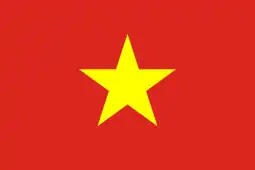Corruption in Vietnam
Corruption in Vietnam is pervasive and widespread, due to weak legal infrastructure, financial unpredictability, and conflicting and negative bureaucratic decision-making. Surveys reveal that while petty corruption has decreased slightly throughout the country, high-level corruption has significantly increased as a means of abuse of political power.[1] Corruption is a very significant problem in Vietnam, impacting all aspects of administration, education and law enforcement.
| Political corruption |
|---|
 |
| Concepts |
| Corruption by country |
Vietnam is an authoritarian one-party state under the Communist Party of Vietnam (CPV). The party claims that corruption has moved up the political agenda in the country, and the legal framework for tackling corruption has become "better developed". However, political academics have cited that such efforts are likely a cover for a political purge between factions of the party.[1]
Ranking
Transparency International's 2022 Corruption Perceptions Index, which scored 180 countries on a scale from 0 ("highly corrupt") to 100 ("very clean"), gave Vietnam a score of 42. When ranked by score, Vietnam ranked 77th among the 180 countries in the Index, where the country ranked first is perceived to have the most honest public sector.[2] For comparison with worldwide scores, the best score was 90 (ranked 1), the worst score was 12 (ranked 180), and the average score was 43.[3] For comparison with regional scores, the highest score among Asia Pacific countries [Note 1] was 87, the lowest score was 17 and the average score was 45.[4]
Pervasiveness of corruption in Vietnam
Vietnam is a developing country of about 96 million people.[5][6] Due to the international view of corruption in Vietnam, in 2020, foreign direct investment (FDI) in Vietnam stands at only US$28.5 billion, far below its ASEAN neighbours.[7]
Anti-corruption efforts
The Vietnamese government has claimed that it has taken efforts to combat corruption, although its effects remain to be seen.[8]
Officials implicated by the anti-corruption campaigns in Vietnam
- Đinh La Thăng: former Minister of Transport, former Communist Party Secretary of Ho Chi Minh City, and former member of the Politburo.
- Nguyễn Đức Chung: former Major General of the Vietnam People's Public Security and Vietnamese politician. He is a former Chairman of the Hanoi People's Committee.
- Nguyễn Thanh Long: Minister of Health from July 2020 to his removal from the Communist Party of Vietnam in June 2022 for involvement in the Việt Á corruption scandal.
- Trịnh Xuân Thanh: Former Vietnamese politician and businessman. He is the former head of the state-owned Petrovietnam Construction Joint Stock Corporation (a subsidiary of Petrovietnam) and the former Deputy-Chairman of the Provincial People's Committee of Hậu Giang.
- Nguyễn Xuân Phúc: Former President of Vietnam implacated in the Việt Á scandal. Resigned on January 23, 2023
- Dương Bá Thanh Dân: Director of the Department of Medical Supplies at the Center for Disease Control and Prevention, or CDC, in the Southeastern Province of Ninh Thuan, and his employee Nguyễn Đăng Đức.[9]
- Đào Hữu Long: Director of Thua Thien Hue Provincial Registration Center.
- Tô Anh Dũng: Former Vice Minister of Foreign Affairs due to allegedly receiving bribes up to add companies to a list of providers of repatriation flights.[5]
See also
Notes
- Afghanistan, Australia, Bangladesh, Bhutan, Cambodia, China, Fiji, Hong Kong, India, Indonesia, Japan, Laos, Malaysia, Maldives, Mongolia, Myanmar, Nepal, New Zealand, North Korea, Pakistan, Papua New Guinea, Philippines, Singapore, Solomon Islands, South Korea, Sri Lanka, Taiwan, Thailand, Timor-Leste, Vanuatu, and Vietnam
References
- "Vietnam Corruption Profile". Business Anti-Corruption Portal. Archived from the original on 2 July 2015. Retrieved 2 July 2015.
- "The ABCs of the CPI: How the Corruption Perceptions Index is calculated". Transparency.org. Retrieved 27 May 2023.
- "Corruption Perceptions Index 2022: Vietnam". Transparency.org. Retrieved 27 May 2023.
- "CPI 2022 for Asia Pacific: Basic freedoms restricted as anti-corruption efforts neglected". Transparency.org. Retrieved 27 May 2023.
- "GDP, PPP (current international $) | Data". data.worldbank.org. Retrieved 2018-11-18.
- OECD Development Centre (2017), “Youth Well-being Policy Review of Viet Nam”, EU-OECD Youth Inclusion Project, Paris.
- "Vietnam Insights: Economic performance 2020 and forecast for 2021".
- "State President targets stronger push against corruption in 2021-25 period". hanoitimes.vn. Retrieved 2021-05-17.
- web.archive.org. 2023-03-18 https://web.archive.org/web/20230318155501/https://web.archive.org/screenshot/https://www.rfa.org/english/news/vietnam/test-kits-03102023125951.html. Archived from the original on 2023-03-18. Retrieved 2023-03-18.
{{cite web}}: Missing or empty|title=(help)